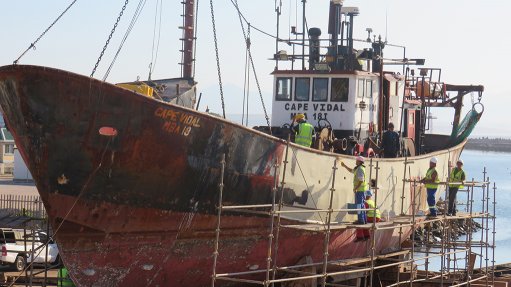
The Cape Vidal vessel underwent repairs during its two weeks stay at Port of Mossel Bay
A steady flow of work at the Port of Mossel Bay’s ship repair facility is helping to create much-needed jobs in the region as the country battles widening job losses owing to Covid-19 and the national lockdown, says the Transnet National Port Authority (TNPA).
This follows the May reopening of ship repair facilities operated nationally by TNPA, when South Africa progressed to Level 3 of its risk-adjusted strategy to reopen the economy.
The slipway – which primarily serves the fishing industry – services an average of three vessels a month, with a minimum duration of one week per vessel, creating on average 20 jobs per vessel.
Notable occupation in May and June included the Luna Moon vessel, which docked for two months for repairs as well as the Cape Vidal vessel, which has been docked for two weeks. The facility has also been booked for the repair of two vessels in July.
Typical jobs created per repair include welders, painters, scaffolders and mechanical services. The continuous booking of the facility by role-players in the fishing industry plays a critical role towards job creation in Mossel Bay and South Africa as a whole.
In the 2019/20 financial year, about 240 jobs were created for the benefit of Mossel Bay community members who are appropriately skilled as per the requirements of each vessel.
Plans are also in the pipeline to rehabilitate the facility and almost triple its capacity within the next three years.
“At present, the facility handles 13 vessels with a weight of 200 t/y. However, the rehabilitation earmarked under Operation Phakisa will see it being capable of handling more than 40 vessels per year with a maximum of 500 each in the next three years,” says Mossel Bay port manager Shadrack Tshikalange.
Operation Phakisa is the government programme aimed at creating jobs and growing the oceans economy.
“Once the current slipway facility has been rehabilitated and upgraded, and safety and efficiency have been improved, more and bigger vessels will be attracted back to the port, which will generate better revenue streams for the port and create more jobs and grow the economy for the region,” he adds.
The port’s slipway enables loading and off-loading of vessels, as well as vessel repairs. Fishing operations form part of break bulk commodities at the port and are among South Africa’s critical business continuity services aimed at ensuring food security for all citizens.
The slipway is of significant importance for the region because the Port of Mossel Bay is historically known as a fishing port. Players like Seavuna, Viking Fishing, Afro Fishing and smaller fishermen from local communities help to create sustainable jobs within the port for the Mossel Bay community,” Tshikalange notes.
Further job creation will be supported by the remodelling and revival of the former I&J Factory into a fish meal factory by Afro Fishing. This venture is not only expected to create an additional 250 jobs in the fishing industry, but is also expected to contribute towards the use of the slipway by smaller fishing vessels.
In addition, smaller vessels from St Francis Bay, including fibre-glass vessels from the Chokka Industry, use the slipway on a regular basis.
“It is important to note that the port itself also depends on the slipway from a marine perspective. Where engineering and external hull repair services are required for the port’s Artic Tern workboat and the Snipe launch boat, the port makes use of specialised external service providers in order to ensure that we contribute towards the creation of jobs in our region. The sourcing of material required in order to constantly maintain our vessels, is also done through local service providers,” says Tshikalange.
He said the continuation of critical services and the upcoming rehabilitation illustrates the port’s commitment towards ensuring the South African economy survives the Covid-19 pandemic.
“The planned rehabilitation of our slipway is in line with the Port of Mossel Bay’s commitment towards achieving the strategic goals of Operation Phakisa, which include efficiency and economic improvement by providing technologically modern facilities, increasing the volume of and size vessels handled per year and creating employment opportunities,” he says.
The port plans to widen the ship repair facility and support services it offers.
“This will help stimulate local and regional supply chain opportunities due to increased vessel handling and the provision of a mechanism for the expansion of employment and training opportunities in ship repair and heavy mechanical industry sectors,” Tshikalange adds.